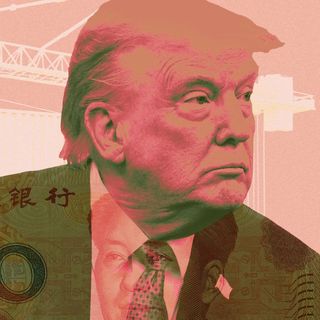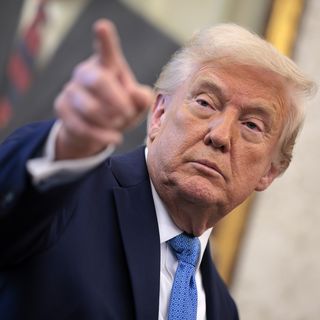China's not backing down from Trump's trillion-dollar game of chicken
President Trump is putting China's economy through a trillion-dollar stress test, and he may not like the result.
Why it matters: Treasury Secretary Scott Bessent insists China is far more reliant on the U.S. than vice-versa, and thus has no choice but to blink first.
- But Chinese President Xi Jinping's disinclination to rush to the table suggests he thinks time is on China's side.
- We're about to get some indications of who is right.
The big picture: China says it sent around 15% of its exports, worth $525 billion, to the U.S. last year — about 3x what flowed in the opposite direction. (U.S. data differs on the total value by nearly $100 billion, but the ratios are about the same.)
- New export orders are already falling sharply, portending empty shelves and price hikes in the U.S.
- But Bessent has claimed China would be hit far harder, potentially losing 10 million jobs just in the near-term.
- "I believe that it's up to China to de-escalate, because they sell five times more to us than we sell to them, and so these 120%, 145% tariffs are unsustainable," he told CNBC.
- China's inflation and retail sales data in the coming weeks should provide the first insights into whether the country could really outlast the U.S. in a prolonged trade war.
Between the lines: China has been endeavoring for years to reduce its reliance on exports to the U.S., and the hunt for alternative markets has taken on a new urgency.
- E-commerce sales for low-cost Chinese retailers have started to tick up in Europe, though the degree to which other markets can replace the U.S. will likely depend on the product.
Beijing has also been trying to convince its savings-conscious consumers to buy more of what China produces, highlighting stronger spending as an economic priority.
- The government has been offering vouchers and subsidies directly to consumers, including rebates to trade in old cars and appliances.
- It announced additional measures last month to "vigorously boost consumption" across a range of industries.
- The government is also rallying citizens and corporations with a nationalistic message that China is being unfairly targeted.
Zoom in: If Chinese consumers start spending and absorbing some originally U.S.-bound goods, authorities in Beijing have a lot more room to stand their ground.
Reality check: While China's economy may prove more adaptable than Bessent hopes, many ordinary Chinese will undoubtedly be hurt by the trade war, just as many Americans will.
- While it's unclear which side will be hit harder, "Chinese leaders have sort of committed themselves to rolling out stimulus, depending on the economic conditions," according to Tianchen Xu, senior economist at The Economist Intelligence Unit.
- "For example, if the export sector is really struggling and it leads to a substantial rise in unemployment and social stability risks, then I think they will be quite decisive in terms of providing more support."
What to watch: The tariff pain is more likely to translate to immediate political pressure in the U.S. than in China, both because of the nature of the two political systems and because people on both sides know it was Trump, not Xi, who chose this fight.
Go deeper: How China will ensure the trade war hurts the U.S.



